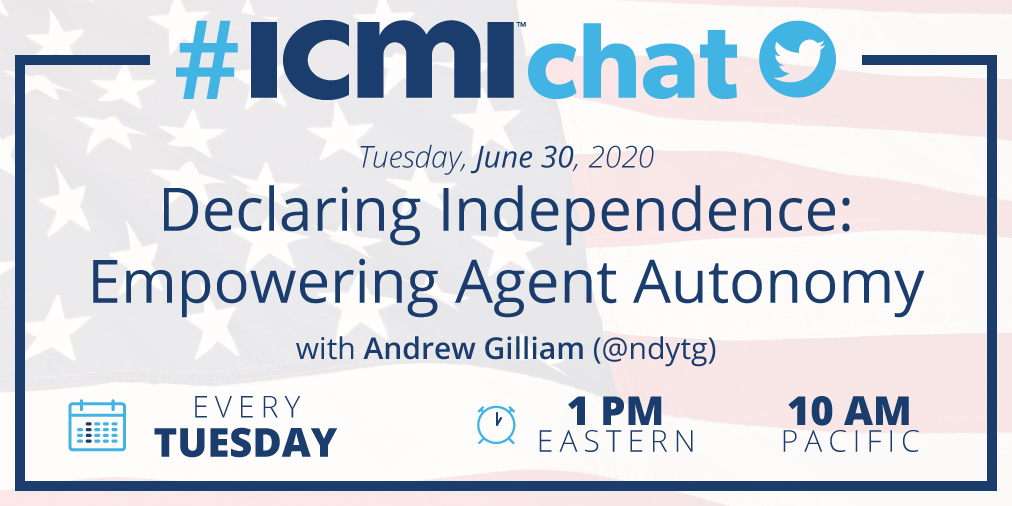By
The Editors
|
Date Published: June 24, 2020 - Last Updated September 08, 2020
|
Comments

Most contact centers utilize some form of quality management. Agents may remember these as times when they were corrected for not following procedures to perfection, but there's a lot more to quality assurance (QA) than catching people who make a mistake. The best quality teams try to help agents be more successful in their jobs, not only by enforcing rules but also by identifying areas where systems and processes can be improved to make agents work easier.
Join us on Tuesdays at 1 p.m. Eastern, 10 a.m. Pacific to weigh in on the contact center industry's most pressing challenges. Next week, we explore "Declaring Independence: Empowering Agent Autonomy." A question preview follows this article.
QA has a multifaceted role in customer experience, too! Of course, they help deliver consistent service, but they also can identify pain points that need to be addressed further. In this week's #ICMIchat, our community explores how quality management helps contact centers progress toward their strategic goals.
Defining Quality Assurance
Although it goes by a few names, quality assurance, quality management, and monitoring describe the process of evaluating contacts in a uniform and systematic way. The goal is to deliver the best possible service as consistently as possible, while also incrementally improving service delivery. Giving feedback and coaching are essential to this process.
I like to think of QA as the filter that identifies strengths and opportunities from the perspective of the company (process, tools, people), customers, and agents (performance). I think shifting between these three perspective is important.
QA is continually improving service to exceed the cust exp. Developing a structured plan to not only create a survey to gain insight into our customers’ perception but utilize those results to become more customer-centric.
Quality assurance (QA) in a contact center should be a whole range of management, measurement, coaching & training behaviors that ensure customers receive correct, friendly, responsive help when they need it.
Quality Processes
Quality assurance means listening to, reading, or observing customer contacts, considering how well they were handled, and providing recommendations for improvement. Although the process is commonly considered a way to evaluate agents, QA teams should also watch for customer or agent feedback to improve processes or reduce friction.
Quality management process involves lots of data, and the first step is defining which data matters the most. Define data>collect>analyze to provide agent feedback>rinse and repeat.
Old skool QA consists of a human evaluating interactions, scoring them, and depending on the team, some provide the feedback to the agents. New skool QM: analytics does majority/all the evaluation, feedback to agents is automated.
Time is key. There is no way any conclusions can be determined by reviewing data daily!There needs to be time for information gathering(surveys,metrics,etc) to ensure the changes being made improves services.
Setting Standards
To determine if a contact was handled well or poorly, it's essential to have a set of standards or expectations to judge against. Creating arbitrary rules may lead you in the wrong direction; consult all of your stakeholders when determining what makes a contact great. Don't forget to use agent feedback and voice of the customer research to check how customers will react to new procedures.
Many people should help define. Examples:
-Marketing can help align with brand voice.
-Leaders can help set a standard aligned with company mission.
-Agents can tell you practically what works with customers and what doesn't.
Lots of great answers to this one - I’ll add: asking reps “what makes a quality interaction?” or to redesign an existing form, can be transformational. The answers are illuminating and it creates ownership that can’t be replicated.
Quality Contributions
Quality assurance itself doesn't make contact centers great. Instead, greatness comes from how contact centers use QA practices to achieve other strategic goals, such as agent experience, customer satisfaction, and cost management. Quality ratings are not the goal; they are the yardstick to measure progress towards other goals.
QA contributes to contact center's success because it requires us to define the behaviors that matter to customers & measure whether we're doing them. Marketing, HR, Comms should bow down to a contact center that can assure quality. Those teams often just estimate quality.
Interesting question. The theory is that as QA goes, so to go CX, CSat, business & ops results, etc. But that is a very big jump that I don't necessarily believe is accurate. QA for QA sake us useless. QA to enhance CX, Csat, and valuable KPIs is what matters.
QA (done right) represents the customers' perspective and thus helps a business to tailer itself to its customers.
Who's In Charge
When it comes to coaching and feedback, there are many ways to integrate quality assurance into a contact center's culture. However you do it, scores and recommendations must be consistent individually and across agents. Mixed messages and unclear suggestions will make it seem impossible to win.
I’ve seen great teams in contact centers where peer-to-peer QA recommendations are successfully incorporated into the culture. I’ve also seen centers where only the QA team/supervisors provide feedback. Both can work. The important thing is to be consistent and fair.
1. The initial onboarding should topically cover standards.
2. Their supervisor trains on what they are and how to achieve them.
3. QA Teams regularly coach based on overall learnings.
Going Scoreless
Many organizations are moving to scoreless QA to help refocus coaching on what matters most, serving customers better. While scores are not inherently wrong, they can be a distraction from the most critical messages QA teams seek to share. Metric focused agents could worry more about gaming the system to increase scores rather than improving how they work, and that doesn't help anyone succeed.
I remind clients - you can still “score” for trending and tracking but not use scores as a component of the feedback process (e.g. not share w reps, not include in ranking or renumeration).
We love to have numbers to make us think we know how good/bad we are. But the QA score isn't necessarily a full reflection of CX or CSAT. Giving up scores is new for most of us. Downside: QA is no longer a line item or packaged item to sell to our bosses.
QA and Performance Management
Many organizations use additional performance management systems, such as annual appraisals or 360-reviews, driven by human resources. While one system may inform the other, take advantage of the different perspectives and opportunities to give and receive feedback offered by your company-wide performance system.
I have learned QA scores should be used as an incentive for the whole team. When I did this employees were more willing to help other coworkers be successful. Individualizing scores will make an employee only worry about themselves.
It's definitely a part of the conversation but one of 4-5 different pillars to look at to evaluate performance. Granted, certain aspects of that QA form are CRITICAL for the agent to remain employed.
QA Is For Everyone!
Even small contact centers can benefit from QA practices! While large contact centers must take more care to be consistent across multiple sites and large QA teams, the underlying principles of monitoring remain the same. The first step toward successful quality management is the first one, making time to try it.
QA is for everyone! We can mold it to fit the needs of each team but the desire to improve and adapt is present in teams of all sizes.
QA is for ALL contact centers but let's just say that things like reporting and calibration require more intention and coordination in larger, distributed teams.
#ICMIchat June 30, 2020
Declaring Independence: Empowering Agent Autonomy
Next week, #ICMIchat celebrates U.S. Independence Day by discussing a different type of independence: employee empowerment. Empowered employees may make or break a customer's experience, but employees need to be empowered within a framework that protects all stakeholders.

Q1: What is employee empowerment?
Q2: Is employee empowerment important to customer service or customer experience?
Q3: Why might empowering employees be difficult for managers? Are any fears particularly common?
Q4: How might a manager, leery of empowering their employees, mitigate risk and overcome their concerns?
Q5: How do/should employees know when they have the authority to make a decision themselves versus needing to involve a higher level of management?
Q6: How can you correct an employee who oversteps their authority, without demotivating them or discouraging their initiative?
Q7: How can managers reduce an employees’ dependence on others, when they’re not working independently enough?
Q8: Is bending or breaking a policy ever acceptable, and how should employees know when to do it?